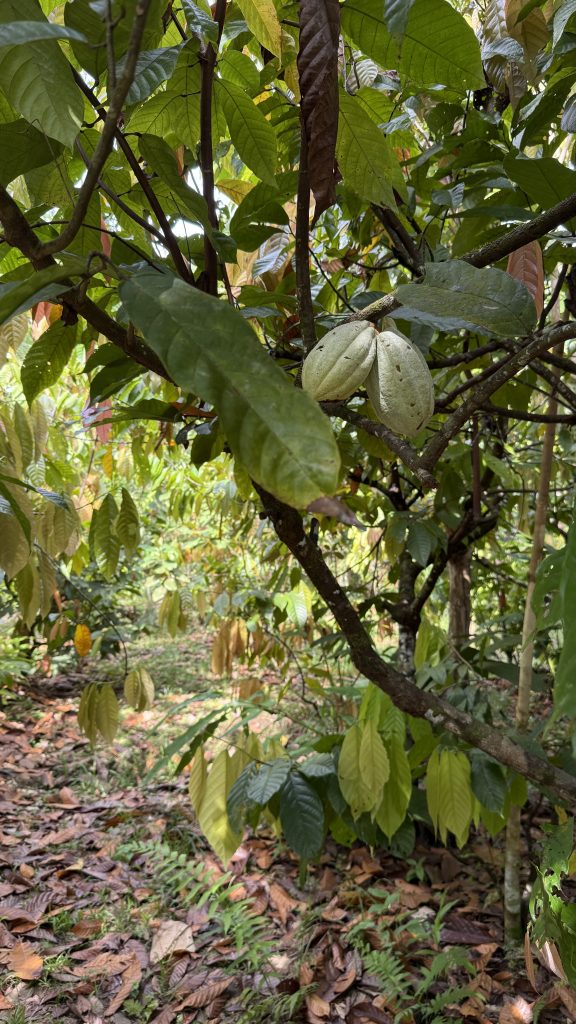As I recline on an adirondack chair under the veranda, staring up at the now-sleeping bats which fluttered above my head yesterday evening, my thoughts settle into a peaceful, contented rhythm. Psychologists might call this ‘the nature effect’, but whatever term you use my point is: this place is something special.
Finca Köbö (Köbö means ‘dreams’ in the indigenous Guayami language) lies on Costa Rica’s ‘wild’ Osa peninsula. It is the brainchild of self-proclaimed ‘Agriculturalist and Dreamer’ Alex Retana Mena, along with his wife Jutta and their children. Alex’s first dream was to own a Ceiba tree; he now has three on his property. The dream grew and morphed over the years into what has now become an impressive chocolate and vanilla production, agroforestry, conservation and ecotourism enterprise.
The process hasn’t been easy, however. Reflecting upon his journey thus far in 2007, about 5 years into the project, Alex remarked: “We are looking for a way to survive as farmers but at the same time develop a less exploiting form of production. We want to create a place, where the protection of the soil, the water, and both ecosystems – the agricultural and the natural one surrounding it may be combined with profitable farming.” In 2025 he continues to describe this mission as a work in progress, but the progress is quite clear when you look around and consider that when he started much of the landscape and soil were degraded from intensive farming.
Whether you stay just a few hours or several days (I recommend the latter), you’ll likely leave feeling a little bit better about the world (and not just because of the theobromine in the chocolate!). Finca Köbö isn’t just telling the story of conservation, it’s demonstrating it. And the (chocolate) icing on the cake: this is a truly nature-positive project with potentially far-reaching benefits for society and future generations.



One property, many ecosystems
Approximately 60% of Köbö’s 20 hectares of land consists of primary and secondary forest, biological corridors and regeneration areas. These aren’t haphazardly placed – the biological corridors, for instance, are carefully located to facilitate the movement of wildlife between feeding areas. Similarly, the areas designated for human use were built in a location where they would pose the smallest disruption possible to animal life.
Although it is a working farm and ecotourism project, only about 40% of the finca’s land is dedicated to these activities. Yet the sheer variety of crops under cultivation is impressive for such a small area.
It’s truly inspiring to listen to Alex and his dedicated team describe the goals of their project, which include maintaining a ‘living seed bank’ of rare, near-forgotten plant and fruit varieties. Despite the distinct impression that they are in a David vs. Goliath kind of struggle, I left with a feeling of hope. Hope, that the efforts of people like them will leave a lasting mark by helping ensure the protection of agricultural biodiversity, and by extension food security.



Not your run-of-the-mill chocolate tour
Finca Köbö is best known for its chocolate, and alongside vanilla is the main source of the farm’s income. They offer a two-hour chocolate tour, but participants learn about much more than just cacao. It’s a very informative and entertaining introduction to the world of organic agroforestry and biodiversity preservation, followed by a hands-on demonstration of how chocolate is made and of course some seriously decadent chocolate cake paired with fresh fruit from the farm.
Even if you’ve toured a chocolate farm before (I had), I’d still recommend participating because this tour is quite honestly a lot of fun. They generally run two tours a day, in the morning and afternoon. Allow three hours total, so you have time to relax and enjoy the food and refreshments afterwards. Booking ahead is recommended.


For those who stay longer: a little slice of paradise
From the ever-present sounds of nature to the beautifully maintained gardens, the finca invites overnight guests to slow down and unwind. Whether it’s your own villa’s terrace, a quiet corner of the open-air dining and lounge area, or next to the swimming pool, a place for rest and relaxation is never hard to find.
But that doesn’t mean there’s nothing to do! Visitors are free to wander through the gardens, and there’s a hiking trail through the property’s primary and secondary forest and biological corridors. They are also happy to help guests arrange various activities in the wider region, everything from hikes to boat tours to visits to indigenous villages.
The finca’s accommodation is a mix of rooms and bungalows, all with private bathrooms and including a delicious breakfast. Don’t miss Jutta’s fabulous bread! There are drinks available in the lounge area, and if you just can’t bring yourself to ‘unplug’ wifi is also available in both individual rooms and common areas.

Costa Rica is widely known as a powerhouse of conservation, reforestation and ecotourism, and Finca Köbö is in good company with many other hybrid conservation/tourism projects throughout the country. Still, it stands out as particularly special, not least because of the passion of one family to pour decades of effort into restoring an ecosystem while proving for over 20 years now that this can be done alongside a successful regenerative farming and ecotourism business. ‘Pura Vida’, indeed.

You may also like:
No related posts.

